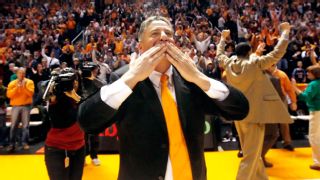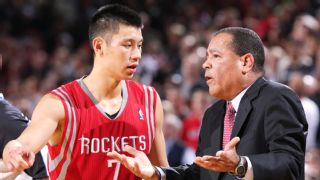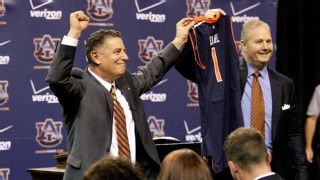|
The question was simple and intentionally direct: Was Kelvin Sampson's return to college coaching at all motivated by a desire to clear his name? The answer, though brief in words, was far more complex. Sampson paused for a good 15 seconds, a stretch that can feel like an eternity in a phone conversation. He finally exhaled and answered. "Yes,'' he said, stretching out the word and pausing again. "I'm not going to go any deeper than that, but yes.''  In sports, there is always a winner and a loser, and eventually the sting from even the toughest loss dissipates. But what if something else is lost in the quest for the big win, something more precious than a game? Like a reputation? What then? How do you come back? Two NCAA sinners are about to answer that question this coming season: Sampson at Houston and Bruce Pearl at Auburn. Done in by hubris as much as by the NCAA rulebook, they each were fired from good jobs and slapped with a show-cause penalty, their transgressions deemed so egregious that they were told to stay away from college basketball for a while. This is the part where we're supposed to pause and say that they are cautionary tales that got lucky, one-time cheaters who have found compliance and are on the path back to NCAA righteousness. Except we don't know that -- at least not yet -- and neither is exactly a placard-carrying penitent. They are apologetic, if not entirely remorseful, stung and embarrassed, if not altogether humbled. They admit their sins but with their own asterisk -- the rule that sent Sampson out no longer exists; Pearl contends the punishment for his crime was too severe. "I'll say it now and I said it then: I ran a clean program; I didn't cheat,'' Pearl said. "We made some mistakes. We made some bad decisions and we didn't handle it well. But people are going to believe it or not believe it and think how they're going to think. There's nothing I can do at Auburn that will change what people think.''
On a scale of 1 to an overstuffed Emery envelope, their sins really don't seem so bad: Sampson called recruits too often; Pearl hosted recruits at a barbecue during an unofficial visit. It was their arrogance that really did them in. Sampson committed the same NCAA crime at Indiana after being dinged for it at Oklahoma. Pearl told others to lie about the barbecue, then he lied, insisting he didn't recognize a picture in his own backyard. The NCAA doesn't suffer cheaters well, but it suffers repeat offenders and lying ones even worse. Sampson was booted for five years, Pearl for three. To break the same rule twice? To lie about your own backyard? Those were tee-ball setups that plenty of people gladly took a swing at. Sampson, once the president of the National Association of Basketball Coaches, and Pearl, the most popular cheerleader in Knoxville, went from kings of their profession to human piñatas, all of that adulation and respect replaced by ridicule and humiliation.  Both insist they didn't listen to or read what was said about them, that in a world of 24/7 media they somehow found quiet. But that's as impossible as pretending the free fall didn't hurt, and in their defiance, the sting from the stigma is still evident. "There's a lot of things I could have said and maybe I should have said to clear things up,'' Sampson said. "You want to come back and defend it, but I chose to say nothing. It was the sensationalism that got me.'' Added Pearl: "Look, when I got my penalty, I thought it was more severe than what I was anticipating. But I'm not the judge of what the penalty was. I did what I did. I paid an enormously huge price for it. I still think it was more severe for the mistakes that we made, but that was the penalty that was decided.'' There are three ways to carve a comeback trail -- the phoenix out of the ashes/drop to the low-major level of coaching or assistant-coaching gig method; the out-of-sight, out-of-mind option; or the hide-in-plain-sight avenue. The NCAA's penalty meant the first option wasn't available for either, so Sampson went for door No. 2, disappearing into the NBA ranks; Pearl chose No. 3, staying relevant through television. Sampson redefined himself in the league, earning the same reputation there that he had before it all fell apart in the college game -- as a smart and meticulous coach. Pearl, in the meantime, kept his personality and image front and center via TV cameras. He was in the game but on the periphery, far enough removed to put space between him and his violations, but close enough to remain popular. Like a second-string quarterback, no one is as popular as the charming fired-coach-turned-analyst. "I loved what I was doing at ESPN, and I wanted to get good at it, but I knew my window wouldn't be open [to coach] forever,'' Pearl said. Sampson saw his window closing similarly in the NBA. The demographics there are changing, and Sampson realized he didn't fit. "When Brooklyn hired Jason Kidd, Boston hired Brad Stevens, when the next coach is going to be Steve Kerr and Fred Hoiberg will be a coach, you see the trend,'' he said. "I realized there's no ladder here, no path for me to follow. I didn't want to end my coaching career as an assistant in the NBA.'' That harsh reality coupled with the death of his father, Ned, caused Sampson to rethink his future. So when Houston called, he was ready to say yes. Both coaches' athletic directors parroted the same message when they announced the hiring, that they believed Sampson and Pearl had changed and/or learned from their mistakes. And there has been introspection. The coaches admit that they will be more careful and calculated in their compliance efforts. That's not an admission of guilt, though both did admit they were careless. "Would you rather me be coaching, teaching, motivating, standing in a cafeteria on chairs to get students interested, or would you rather me spend all this time filling out my phone logs?" Pearl asked. "The answer is, you better do both.''
 Pearl is right about that. He is, however, wrong about one thing. There is something he can do at Auburn to change what people think. He can win games. In sports, success is better than a presidential pardon, the balm to even the greatest scourge. Eddie Sutton brought Kentucky to its knees with NCAA scandal, and the court at Oklahoma State now bears his name. No one tangoed more with the NCAA than Jerry Tarkanian, but few won bigger, which is why he's in the Hall of Fame. In the end, this isn't about second chances or taking a risk. It's about winning. And it's a lot easier to extend an olive branch or roll the dice when you haven't won in a long time. Kelvin Sampson was 496-271 as a college head coach. He took Washington State to the NCAA tournament and missed the Big Dance just once in 12 years at Oklahoma. In 10 years as a Division I head coach, Bruce Pearl made eight NCAA tournament appearances. He led Milwaukee to the tourney twice in his four years there, including a Sweet 16 run, and strung together a 145-61 record in his six seasons at Tennessee. These are not the kinds of coaches Houston and Auburn could typically attract. The marriages work because the programs are like their new bosses -- in need of image rehabilitation. The once-proud home of Phi Slama Jama, Houston has been to the NCAA tournament just once since 1992. "What's an easier way to say bad? Let's go with abysmal,'' Sampson said. "The facilities are abysmal. The fan support is abysmal. That's why they're hiring new coaches, and if I can't change that, they're going to get another coach. But I relish that challenge. I like that there is a lot of work to be done.'' As for Auburn's history, it mostly begins and ends with Charles Barkley. The Tigers have made a whopping eight NCAA tournament appearances in their history, the most recent in 2003. Pearl's hiring ranked as arguably the most newsworthy thing to happen in hoops on The Plains in a rather long time. Fans there already envision Pearl doing to Auburn what he did to Tennessee, where the Vols were 14-17 the year before he arrived and 22-8 in his first season. "People say, 'Coach, I'm going to be patient,''' Pearl said. "I don't want to be patient and I don't want anyone else to be patient. Join me in being impatient. Don't quit on us. Come and participate. There's not been a great investment made here in basketball, but I will do the very best that I can to change that.'' And in the process, Pearl, as well as Sampson, might just change something else too. They might change their reputations.
|

